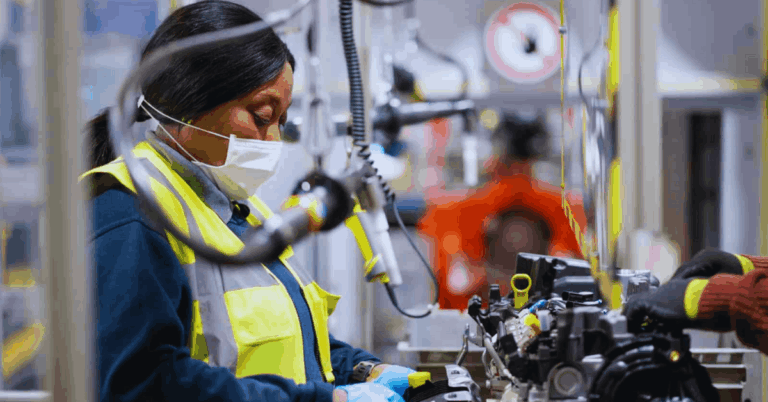Europe is a culinary paradise, offering endless opportunities for those passionate about food and hospitality.
The continent attracts professionals worldwide with its rich food heritage, diverse cuisines, and thriving restaurant scene.
Whether you’re an experienced chef or just starting, European restaurant jobs offer the perfect platform to pursue your culinary dreams.
Why Work in Restaurants in Europe?
Europe’s food scene is known worldwide, providing exciting opportunities for culinary professionals.
- World-renowned culinary scene: From Michelin-starred fine dining to casual eateries, Europe offers a variety of options.
- Skill development: Learn from top chefs and refine your culinary expertise.
- Cultural experience: Work with unique ingredients and cooking methods from various European countries.
- Culinary innovation: Be part of new food trends and cutting-edge techniques.
- Career growth: Europe offers clear paths for advancement, from entry-level to executive roles.
- Networking: Working in top European restaurants helps build valuable global connections.
- Work-life balance: Many European countries prioritize balance, offering time to relax and explore.
Types of Restaurant Jobs in Europe
The restaurant industry offers diverse roles, from the kitchen to the front-of-house.
- Chef & Sous Chef Roles: Oversee kitchen operations, manage teams, and create menus.
- Front-of-House Positions: Serve customers as waitstaff, bartenders, or hosts, requiring strong communication skills.
- Kitchen Support Roles: Dishwashers, prep cooks, and pastry assistants are key for kitchen efficiency.
- Management Positions: Restaurant and general managers handle operations and staff management.
- Pastry Chef Roles: Specialize in creating desserts, breads, and pastries, requiring creativity and precision.
- Sommelier Positions: Focus on wine selection and pairing, enhancing the dining experience.
- Barista and Beverage Roles: Prepare and serve specialty coffee and drinks, requiring attention to detail and customer service skills.

Salary Overview
Salaries vary based on role, location, and experience, but general trends exist.
- Entry-level kitchen roles: Dishwashers, prep cooks, and kitchen assistants typically earn between €1,500 and €2,500 per month.
- Waitstaff and bartenders: Salaries range from €1,800 to €3,000 monthly, often supplemented by tips.
- Experienced chefs and sous chefs: These roles usually pay between €2,500 and €5,000 per month, with higher wages at Michelin-starred restaurants.
- Restaurant managers and general managers: Monthly earnings range from €3,000 to €6,000, often with additional bonuses and perks.
- Pastry chefs: Typically earn between €2,000 and €3,500 per month, depending on experience and restaurant type.
- Sommeliers: Salaries range from €2,500 to €4,500 per month, with top positions offering additional benefits and perks.
- Baristas and beverage roles: These positions generally earn between €1,800 and €2,800 per month, depending on location and experience.
How to Land a Restaurant Job
Finding a job in the European restaurant scene requires effort and strategy.
- Networking: Attend culinary events and connect with industry professionals.
- Job platforms: Websites like Culinary Agents and Indeed offer job listings.
- Recruitment agencies: Some specialize in helping you find restaurant roles in Europe.
- Tailor your CV: Customize your CV for each application and highlight relevant experience.
- Work permits: Research visa and work permit requirements for specific countries.
The Benefits of Working in European Restaurants
There are numerous perks to working in European restaurants, both professionally and personally.
- Competitive wages: Salaries are generally good, with tips providing additional income.
- Professional connections: Build a network that can open doors to future opportunities.
- Iconic cities: Live and work in Paris, Rome, or Barcelona.
- Cultural immersion: Experience European food cultures and culinary traditions.
- Career development: Gain valuable experience and skills that can advance your career in the culinary world.
- Workplace diversity: Experience a multicultural environment by working with people from all over the world.
- Job stability: The growing demand for skilled restaurant workers in Europe offers long-term employment opportunities.
Challenges to Consider
While the European restaurant industry is rewarding, it has its challenges.
- Language barriers: Some regions may require knowledge of the local language.
- Cultural differences: Each country’s work culture may take time to adjust to.
- Long working hours: Expect evenings, weekends, and holiday shifts.
- Cost of living: Major cities can have high living costs, requiring careful budgeting.
- Seasonal fluctuations: Some restaurants experience slower business during off-peak seasons, affecting job stability.
- Workplace pressure: The fast-paced nature of the restaurant industry can lead to stress and high expectations.
- Health and safety regulations: Compliance with strict health and safety standards is essential, which can be challenging in some locations.
Tips for Success in the European Restaurant Industry
You must stay focused and dedicated to thriving in Europe’s competitive restaurant world.
- Be adaptable: Stay open to learning new techniques and adjusting to different environments.
- Strong work ethic: Show up on time, stay committed, and build a reputation.
- Network: Connect with colleagues and industry professionals to expand your career prospects.
- Stay updated: Keep learning about new trends and techniques to stay competitive.
- Embrace feedback: Accept constructive criticism to improve your skills and grow professionally.
Work-Life Balance in the Restaurant Industry
Balancing work and life can be tough in the fast-paced restaurant business, but it’s crucial.
- Understand the hours: Be ready for long shifts, including weekends and holidays.
- Prioritize rest: Take time off to avoid burnout and recharge.
- Manage stress: Learn how to handle stress effectively to stay productive and healthy.
- Set boundaries: Establish limits to maintain a healthy work-life balance and prevent exhaustion.
- Stay organized: Develop good time management skills to handle busy shifts efficiently.
Training and Professional Development
To grow in the European restaurant industry, continuous learning is essential.
- Culinary education: Formal education is beneficial, but hands-on experience is just as necessary.
- Certifications: Enhance your skills with certifications in areas like wine pairing or sustainable cooking.
- Continuous learning: Stay updated with new trends, techniques, and industry changes.
Exploring Different European Culinary Cultures
Working in European restaurants offers the chance to learn about diverse food traditions.
- Regional cuisine: Discover different cooking styles, like Italian pasta or Spanish tapas.
- Local ingredients: Many restaurants prioritize fresh, locally sourced ingredients.
- Embrace diversity: Learn from various cultures and broaden your culinary expertise.
- Traditional techniques: Gain knowledge of classic cooking methods unique to each region, enhancing your culinary skills.
- Fusion cuisine: Explore creative ways to combine regional flavors and modern techniques for innovative dishes.
The Future of the Restaurant Industry in Europe
The European restaurant industry is evolving with new trends and technologies shaping the future.
- Sustainability: More restaurants are adopting sustainable practices to reduce waste and focus on local sourcing.
- Plant-based dining: The rise of plant-based and vegetarian menus drives demand for innovative dishes.
- Technology: Automation, digital ordering, and other tech innovations are changing the industry.
To Conclude
A career in the European restaurant industry offers endless opportunities to grow and pursue your passion for food.
Whether you’re an aspiring chef or restaurant manager, Europe’s vibrant culinary scene is the perfect place to start your journey.
Explore the exciting world of European restaurants and unlock your culinary passion today!












